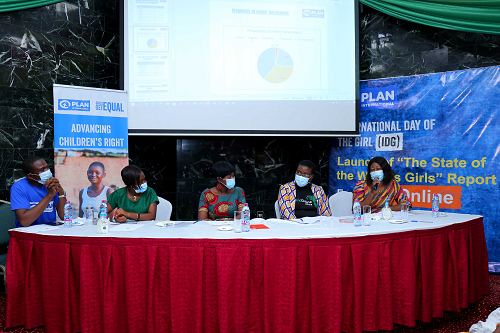To mark International Day of the Girl, Plan International – Ghana, a development and humanitarian organisation that advances children’s rights and equality for girls, has launched the “FreeToBeOnline” campaign to protect girls from online abuse and harassment.
The campaign seeks to create awareness on online safety and abuse as well as provide means by which victims of online abuse could report or overcome such menace.
The FreeToBeOnline campaign was launched alongside the State of the World’s Girls Report aimed at educating the general public on the effects of online abuse on girls and young women.
In his speech, Country Director for Plan Ghana, Mr. Solomon Tesfamariam revealed that a study conducted by Plan Ghana in 22 countries shows that 58% per cent out of 14,000 girls observed across the globe have experienced various forms of online harassments.
A breakdown of the report revealed that 28 per cent of the total number studied faced harassments on Facebook, 14 per cent on WhatsApp, 5 per cent on Instagram, 2 per cent on Twitter, 1 per cent on Snapchat, 1 per cent on YouTube, and 1 per cent on other platforms.
The report also said online harassments of girls start from age 8 and majority were harassed for the first time between the ages of 14 to 16.
According to the report, at least 85% per cent of girls faced sexual harassments; 64 per cent, abusive and insulting language; 57 per cent, threats of sexual violence; 50 per cent, purposeful embarrassments; and 43 per cent, body-shaming attacks
Mr Tesfamariam said: “Some overarching categories of harassment found includes the threats of sexual violence; sexual harassment; threats of physical violence; attacks on the girls’ appearance or intersectional characteristics, including body shaming; unauthorised sharing of the girls’ content, including for the purpose of embarrassing the girls publicly; stalking; and generally insulting and abusive language.”
“As we all work towards the resolution of these age-long issues, we are further faced with a growing menace, which has emanated from the advent of the technological world which we are gradually transitioning into. Abuse and harassment facing girls are fast becoming major threats to girls, with very limited measures to protect them from online gender based violence, especially in these times of the COVID-19 pandemic”, he added.
He, therefore, called for effective and accessible reporting mechanisms that targeted gender based violence to hold perpetrators to account.
Mr. Tesfamariam also advised social media companies to use their technological skills and financial resources to put “freedom online” for girls and young women at the heart of their agenda.










